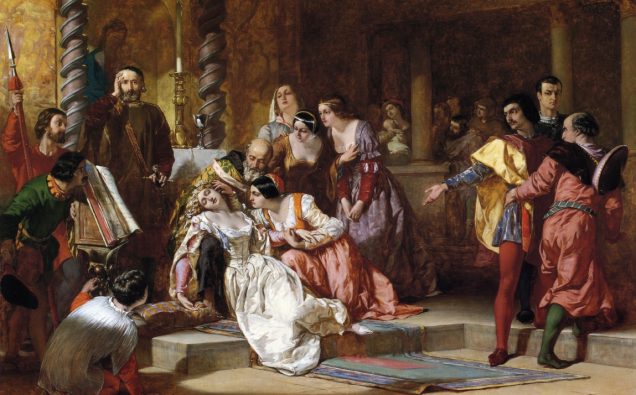
A scene of the church from Much Ado About Nothing Photo: Alfred W. Elmore [Public domain], via Wikimedia Commons
A great while ago the world begun,
With hey, ho, the wind and the rain,
But that’s all one, our play is done,
And we’ll strive to please you every day.
William Shakespeare, Twelfth Night
The most intriguing question that provoked our minds as students of English Literature was seemingly a simple proposition: Did Shakespeare really know so many things and so many levels of interpretations that we try to derive from his use of imagery, ornate language, and his portrayals of a vast variety of human characters in his plays?
Of course, he knew these things, and he knew many more things, Professor Bruce Gill explained to us one day.
We were lucky and often in awe of our high-caliber academia at Murray College, Sialkot which had just 25 students as candidates for Maters’ in English Language and Literature drawn from several towns and cities.
There was Professor Shahid Iqbal Sabir, who had an M. Lit degree from Glasgow, the U.K. in times when Britain boasted a really high standard of higher education. Prof. Sabir, acknowledged as one of the most accomplished Pakistani teachers of literature, taught us some finer points of rhymes and meters as used in the 16th and the 17th centuries by Shakespeare, Milton, and other poets.
Then there was gray-haired grand old Samuel Lal Din, one of the greatest readers of human nature among Pakistani literati. I can still recall how he taught us King Lear and Christopher Marlow’s Dr. Faustus. To me, Prof. Lal Din’s biggest advantages stemmed from a long experience in reading the minds of his pupils, a study of the Punjabi Sufi poets, and his understanding of the English drama. We learned about novel from Assistant Professor Tony Hayat, a popular academic on the campus.
Within two years, we had to absorb a lot of things – poetry, plays, novels, critical appreciation, literary history, and above all make sense of what literature was about. But certainly not a big ask in the intellectually stimulating clime of the campus. Before we dabbled in the stream of English Literature, our renowned academic Prof. Irshad ul Hassan was transferred to Lahore.
Sialkot in those days had this particular quality about it. We were fortunate to have met people who knew firsthand Faiz Ahmed Faiz. Then Iqbal, one of the greatest poets in both Urdu and Persian languages, was always a towering presence in the minds and hearts of the people of his town. Apart from these two poets, Sialkot also produced Taufiq Rafat and Zulfiqar Ghose, two of the finest poets in the English language in the non-English speaking world.
But, for us, the question immediately became clear. What to do about Shakespeare? He had such powerful sway over our minds and hearts. Oh dear God, how could anybody learn and express creatively so many aspects of human life? Was it just the feverish rage of a poet’s imagination? Could it be real, the opposite of Lear in Prof. Shahid Sabir’s words?
My friends Nasir Ahmed and Tahir Mansoor, both now professors at the alma mater, Naseer Malik and Irfan Butt, would often wonder about these things. Then there was the John Garret Library in the heart of the campus to quench our curiosity. Tahir and I would also go to Lahore’s fabled Anarkali Market, the British Council, and other places to get access to any books and people that would help us in the study of literature.
For young people, Shakespeare’s Twelfth Night is a natural attraction, a matter of the heart. A pleasant comedy brimming with the colors of youth, love, music, love of being in love, and so on. Perhaps it was also Shakespeare’s happiest time when he penned the beautiful lines in iambic pentameter:
“Away before me to sweet beds of flowers
Love thoughts lie rich when canopied with bowers”
and
“If music be the food of love, play on.”
![Malvolio and the Countess in Twelfth Night Photo: Daniel Maclise [Public domain], via Wikimedia Commons](https://upload.wikimedia.org/wikipedia/commons/3/3e/R_Staines_Malvolio_Shakespeare_Twelfth_Night.jpg)
Malvolio and the Countess in Twelfth Night Photo: Daniel Maclise [Public domain], via Wikimedia Commons
Nearly all students, carefully selected on merit, were ambitious, hardworking, and imbued with the spirit to go ahead and carve out an edge over others. April flowers and then summer days made the campus as beautiful and fair as anything that our planet could offer.
Our obsession with Shakespeare would take more time than with the works of any other writer. The students had learned by heart countless quotes from Bard’s works. With Shakespeare, we also discovered the great literary critic A.C. Bradley.
I remember our good friend Zulfiqar Ghuman would often ask during discussions: What does “Sheikh Pir” say on this particular subject? A combination of Sheikh (generally a prosperous and worldly successful individual) and Pir (a man of wisdom) was a great summing up of Shakespeare’s life of unsurpassed creativity during which he infused the English language and literature with brave new meanings and gave the world a timeless tapestry of characters.
Now, after years of work and wandering around many places as part of my journalistic work, I still cherish the same curiosity to know more about the Bard of Avon, who, in his contemporary Elizabethan poet Ben Johnson’s words “is not of an age but for all time” Just look at our forever fascination with his sonnets, plays Tempest and Hamlet, and the mystery of the lost years, which leave us so many things to wonder about. Perhaps, the Bard wanted the coming generations to grapple with these mysteries.
But what is it that distinguishes Shakespeare from other writers and poets?
His profound understanding of the human nature, foibles, wishes, joys, and grief of people of all ages– a psychologist par excellence with an unrivaled ability to make use of words with a matchless mastery and artistry and then powerfully express a wide array of emotions, feelings, and situations. The fact that the greatest British export appeals to so many millions around the globe means that people continue to relate to what he says and what he says resonates with them – a boy, a man, a girl, a woman, a king, an elderly citizen, all can experience the sights, sounds, and scents he created with words for performance at London’s Globe theater. A matchless ability to communicate with people.
Shakespeare may have done his plays as the memorable song from Twelfth Night says but he continues to please millions of people, academics, Hollywood fans, film lovers, and researchers around the world with his creative output and continues to fire our imagination like no other literary figure.
The piece is being reprinted to mark William Shakespeare’s birthday on April 23.











Thanks for sharing especially the way you mentioned Prof.S.I.Sabir